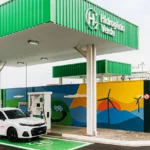You may already know that the transition to electric vehicles (EVs) is an important step towards a more sustainable future. However, the large-scale adoption of these vehicles in Brazil faces several challenges. This week’s article addresses the main obstacles and, of course, presents practical solutions to overcome them.
Challenge 1: Charging Infrastructure
Charging infrastructure in Brazil is still limited, with few charging stations available, especially outside of major urban centers. This raises concerns among potential buyers about the convenience and practicality of EVs.
Proposed solutions:
- Public and private investment: Encourage partnerships between the government and private companies to expand the network of charging stations.
- Tax incentives: Offer tax benefits to companies that invest in charging infrastructure.
- Standardization: Establish national standards for charging stations, ensuring compatibility and ease of use.
Challenge 2: High cost of electric vehicles
The initial cost of electric vehicles is still high compared to combustion vehicles, making them inaccessible to a large part of the Brazilian population.
Proposed solutions:
- Tax subsidies and incentives: Implement subsidies and tax exemptions to reduce the cost of purchasing EVs.
- Local production: Encourage local production of electric vehicles and components to reduce costs and generate jobs.
- Affordable financing: Create specific financing programs for EVs with more favorable conditions.
Challenge 3: Consumer awareness and acceptance
Many Brazilian consumers still have little knowledge about the benefits of electric vehicles and remain skeptical about their efficiency and practicality.
Proposed solutions:
- Educational campaigns: Carry out awareness campaigns on the environmental and economic benefits of EVs.
- Test Drives and Demonstrations: Provide opportunities for consumers to experience EVs and learn their benefits first-hand.
- Influencer Partnerships: Working with influencers and public figures to promote EVs and increase their acceptance.
The adoption of electric vehicles in Brazil is a necessary step towards a sustainable future and the modernization of transportation infrastructure. Although significant challenges remain, proposed solutions can accelerate the transition to a greener and more efficient fleet. With strategic investments, appropriate public policies and a change in consumer mindset, Brazil can position itself as a leader in the adoption of sustainable transportation technologies.


